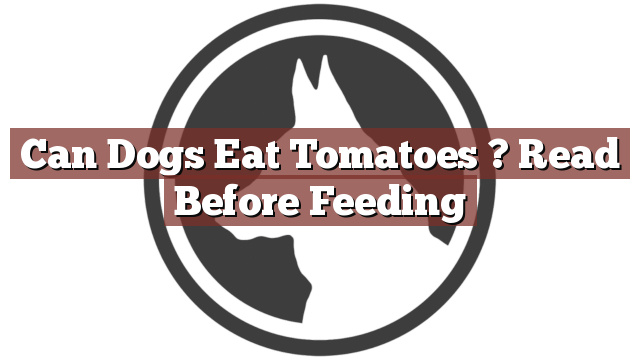Understanding Your Dog’s Dietary Needs
As responsible pet owners, it is crucial to understand our dog’s dietary needs to ensure their overall health and well-being. Dogs are carnivores by nature, and their diet primarily consists of meat. However, they can also benefit from certain fruits and vegetables that provide essential nutrients. It is important to note that not all fruits and vegetables are safe for dogs to consume. Some can be toxic and potentially harmful to their health.
Can Dogs Eat Tomatoes? Read Before Feeding
Can dogs eat tomatoes? This is a common question among pet owners, and the answer is not as straightforward as one might think. While ripe tomatoes are not toxic to dogs, they should be fed to them with caution. The reason behind this is that tomatoes contain a substance called solanine, which can be harmful to dogs in large quantities. Solanine is present in the stem and leaves of the tomato plant, but it is also found in small amounts in the unripened green tomatoes.
It is generally safe for dogs to consume ripe tomatoes in moderation. However, it is essential to remove the stem and leaves, as they contain higher concentrations of solanine. Additionally, it is crucial to feed tomatoes to your dog as a treat or an occasional addition to their regular diet. Feeding them a large amount of tomatoes can lead to digestive upset, including diarrhea and stomach discomfort.
Pros and Cons of Feeding Tomatoes to Your Dog
Feeding tomatoes to your dog can have both benefits and drawbacks. On the positive side, tomatoes are packed with essential vitamins and minerals, such as vitamin C and potassium, which are beneficial for your dog’s overall health. They also contain antioxidants that help boost the immune system and can potentially reduce the risk of certain diseases.
However, it is crucial to be aware of the potential risks associated with feeding tomatoes to your dog. As mentioned earlier, the presence of solanine in tomatoes can cause digestive issues in dogs. Additionally, some dogs may be allergic to tomatoes, resulting in skin irritations, itching, or other allergic reactions. If you notice any adverse symptoms after feeding your dog tomatoes, it is best to consult with your veterinarian.
Conclusion
In conclusion, while ripe tomatoes are generally safe for dogs to consume in moderation, it is essential to exercise caution. Remove the stem and leaves and feed tomatoes as an occasional treat rather than a regular part of their diet. Monitor your dog for any adverse reactions and consult with your veterinarian if you have any concerns. Remember, a balanced and appropriate diet is key to promoting your dog’s overall health and well-being.
Thank you for taking the time to read through our exploration of [page_title]. As every dog lover knows, our furry friends have unique dietary needs and responses, often varying from one canine to another. This is why it's paramount to approach any changes in their diet with caution and knowledge.
Before introducing any new treats or making alterations to your dog's diet based on our insights, it's crucial to consult with a veterinarian about [page_title]. Their expertise ensures that the choices you make are well-suited to your particular pet's health and well-being.
Even seemingly harmless foods can sometimes lead to allergic reactions or digestive issues, which is why monitoring your dog after introducing any new food item is essential.
The content provided here on [page_title] is crafted with care, thorough research, and a genuine love for dogs. Nevertheless, it serves as a general guideline and should not be considered a substitute for professional veterinary advice.
Always prioritize the expert insights of your veterinarian, and remember that the health and happiness of your furry companion come first.
May your journey with your pet continue to be filled with joy, love, and safe culinary adventures. Happy reading, and even happier snacking for your canine friend!

